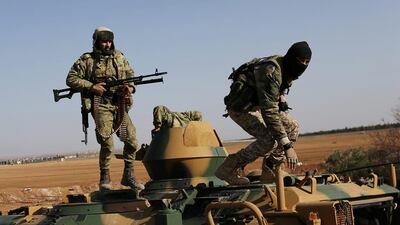In a meeting last week with the families of commandos killed by “Takfiri terrorists” in Syria, Iran’s supreme leader, Ayatollah Ali Khamenei, tried to explain the Iranian presence in that country.
He said that “if the ill-wishers and seditionists who are the puppets of the United States and Zionism had not been confronted in Syria”, then Iranian forces would be standing against them in Tehran, Fars, Khorasan and Esfahan.
Writing in the pan-Arab daily paper Asharq Al Awsat, Saudi columnist Abdulrahman Al Rashid said Mr Khamenei's remarks were mere justifications for the human losses incurred by Iran in its war in Syria, with which it shares no borders.
“The Iranian leadership is heard time and again justifying its external wars. The aim of these explanations is to silence criticisms and objections against the Iranian forces being sacrificed in unnecessary wars to satisfy the ego of Tehran’s religious and military leaderships,” Al Rashid said.
But the longer the war, the greater the losses and the louder the condemnation.
“Questions resurface and the logic of standing up to America and Zionism loses its meaning, overused for over three decades as a slogan whose ultimate goal is to remain in power,” the writer said.
“In the decades following the revolution, the Iranian leadership kept justifying its support of terrorism, its fuelling of regional and international violence, its threats to neighbouring countries, its nuclear programme and its readiness for war,” the writer said.
“Its excuse was the need to defend itself against threats of invasion by the western Zionist world order. But now that it has concluded the nuclear agreement and reconciled with the West, it can no longer present its fear of the enemy as a pretext.”
The writer noted that, instead of opening up and seeking peace, Iran had stepped up its military ventures abroad to the point where it was waging external wars with no guaranteed victories.
He wondered how long the Iranian people would keep suffering the losses and the adventures of the regime in Tehran.
“It all depends on the efficiency and power of security services in maintaining their grip on the street. Formal speeches and propaganda will not last,” he concluded.
In his article in The National's Arabic-language sister publication, Aletihad, Dr Riyad Naasan Agha discussed Iran's expansionism.
The writer said that Iran was looking to annex Syria as it had done in Lebanon and Iraq by imposing its direct military and political power.
“Iran seeks to create chaos in Syria, destroy state institutions and break down the Syrian army, as it has done with the Iraqi army,” he wrote.
Using the example of Hizbollah in Lebanon, the writer said that Iran planned to set up its own militia in Syria to replace the army of president Bashar Al Assad.
According to Agha, Iran’s “useful Syria” plan aims to fragment the country and transform the “useless Syria” into a zone of conflict with the international coalition fighting terrorism.
“Then it would round up Sunnis in a targeted zone described as a terrorist area,” he claimed.
Agha used the example of the Sunnis being uprooted from Aleppo and Rif Dimashq and herded into camps in Idlib. It was not unlikely that many of them would end up victims of a possible holocaust under the pretext of fighting Jabhat Fateh Al Sham (formerly Al Nusra Front), he said.
Agha said that Iran and Mr Al Assad’s regime do not fear ISIL, because evidence had shown that there had been coordination and understanding between them ever since Raqqa then Mosul and Palmyra were “effortlessly handed over too”.
He added that both Iran and the Syrian regime were at ease with the displacement of more than 10 million Sunnis over the past few years, particularly those who had gone to remote countries.
“The Syrian regime has talked about a population balance – referring to the significant decline in Syria’s majority with the hope that it would soon become a minority.
“It is well aware that the refugees are less likely to return to their homeland after five years, and finds no big deal in keeping the millions of displaced in camps strewn over Jordan, Lebanon and South Turkey. After all, Palestinians have remained in camps for long decades before them,” the writer said.
He concluded that reaching an understanding with Iran is out of the question as long as it maintains a hostile approach.
* Translated by Jennifer Attieh
translation@thenational.ae

